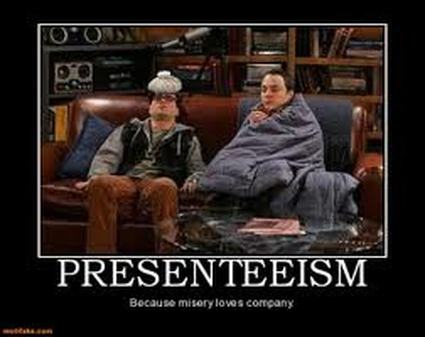Presenteeism – doing more harm than good
Isn’t this a lovely word? I first saw it in a Harvard Business Review article in 2004, where it was described as “the problem of workers being on the job but… not fully functioning”. In this particular instance, it refers to employees coming to work when they are not well, and being really out of it and not terribly useful.
But it made me think about the kind of presenteeism that many managers impose on their people – requiring them to be in the office and do their time despite their being either not fully occupied or, even worse, their being unable to fulfil their work by being in the office. The most obvious case of presenteeism is when salespeople are required to be in the office or clock in and out even though the salesperson who is in the office can be regarded as “temporarily unemployed”! In my experience, this is most common when the pressure is on and backs are against the wall – and the Sales Manager, in desperation to feel like he has some measure of control over things, decides that there should be morning and afternoon “action rooms”. This is the kind of decision that would only be made under situations of high stress. High stress has the impact of shutting down the thinking part of the brain. It does not make any sense – and it just adds to the stress, because those very salespeople are feeling hamstrung by this over-control. Such over-control breeds resentment and disengagement. If you want your salespeople pulling out all the stops to generate sales when the pressure is on, then let them get out there and sell! In fact, give them a hard time when they are in the office.
Isn’t this a lovely word? I first saw it in a Harvard Business Review article in 2004, where it was described as “the problem of workers being on the job but… not fully functioning”. In this particular instance, it refers to employees coming to work when they are not well, and being really out of it and not terribly useful.
But it made me think about the kind of presenteeism that many managers impose on their people – requiring them to be in the office and do their time despite their being either not fully occupied or, even worse, their being unable to fulfil their work by being in the office. The most obvious case of presenteeism is when salespeople are required to be in the office or clock in and out even though the salesperson who is in the office can be regarded as “temporarily unemployed”! In my experience, this is most common when the pressure is on and backs are against the wall – and the Sales Manager, in desperation to feel like he has some measure of control over things, decides that there should be morning and afternoon “action rooms”. This is the kind of decision that would only be made under situations of high stress. High stress has the impact of shutting down the thinking part of the brain. It does not make any sense – and it just adds to the stress, because those very salespeople are feeling hamstrung by this over-control. Such over-control breeds resentment and disengagement. If you want your salespeople pulling out all the stops to generate sales when the pressure is on, then let them get out there and sell! In fact, give them a hard time when they are in the office.
|
A second variation on “presenteeism” is similar to this. There are times in the life of the business executive when things can be very stressful. The business is going through some serious changes, the business environment is presenting you with real disruptors and game changers, and you feel as though you are under siege. Under such circumstances it may be quite natural to want to have your lieutenants around you – close at hand. This way you can speak to them whenever you need or want to. You can call a quick “war room” meeting and decide on how you will respond to each new volley of shots. You can take comfort from the idea that your troops are with you. It makes you feel better. But that is turning things on their heads – and not in a good way. The role of the leader, when the team is under siege, is to provide a calming influence so that that they can think clearly. Demanding “presenteeism” ratchets up the stress and diminishes the quality of the thinking. It also makes people feel over-controlled and, therefore, out of control. They are prevented from doing the things that give them a sense of having some control – going to see customers, spending time with their own teams, getting out of the office there they can think differently – and more clearly. Leadership is never for sissies – even more so when one is under siege. It is the most difficult time to be reflective – and yet there is little that is more essential at such a time. It is under the greatest pressure that we need the greatest presence of mind – to choose for ourselves the behaviours that will give us the outcomes that we seek. If you seek to create further stress and panic, then demand presenteeism. However, if you seek clarity of thought and a coherent response, presenteeism will just not do it.
|
|
A third form of “presenteeism” relates to senior contributors (knowledge workers, project managers and the like) who are managed around their presence in the office. Here we are talking about seasoned and mature contributors who have a track record of pulling out all the stops when the chips are down and quality work must be completed within tight deadlines. When the pressure is on, and without being asked to do so, they work all the hours God sends in order to pull the proverbial rabbit out of the hat. These are the very people who have made a career out of doing the impossible. So when the pressure is off, why do so many managers get twitchy about seeing them in the office – showing up on time, being in the office for the appointed hours, only leaving at the official quitting time?
|
I don’t buy the answer that to treat them differently would “set a precedent”. Hells bells! These people set precedents every time they are asked to pull off a miracle. They behave differently than the average employee, so they deserve to be treated differently – and surely they could expect that their manager would defend them against such complaints?
What is the impact of such a contributor being pulled up for determining their own schedule when the pressure is off? You don’t mind them determining their own schedule when the pressure is on, do you? I can’t see how it is in an organisation’s best interests not to treat these contributors differently. You don’t want these contributors to disengage – and surely they have demonstrated that they deserve a different level of trust?
What is the impact of such a contributor being pulled up for determining their own schedule when the pressure is off? You don’t mind them determining their own schedule when the pressure is on, do you? I can’t see how it is in an organisation’s best interests not to treat these contributors differently. You don’t want these contributors to disengage – and surely they have demonstrated that they deserve a different level of trust?





